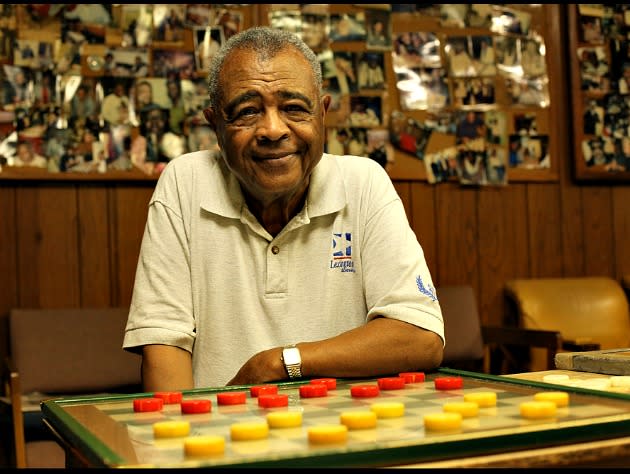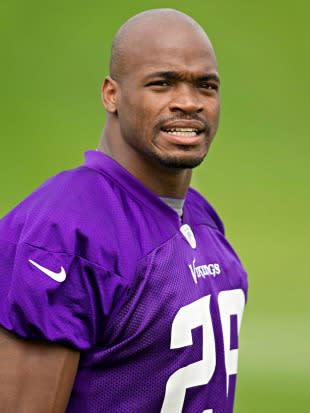Breakfast Table: The draft/auction debate

On a weekly basis during the football season, old friends Michael Salfino and Scott Pianowski discuss (and argue about) football and a series of other random topics. You might enjoy the exchange. You might prefer to be mauled by polar bears. The choice is up to you.
With that impassioned sell job out of the way, we move forward.
From: Michael Salfino
Date: Thursday, Jul 11, 2013 at 1:44 PM
Subject: Checkers Breakfast
To: scott pianowski
So our Twitter auction vs. draft debates now get the full Breakfast Table treatment with no character limits. I'll put on my dunce cap and head straight to the checkers' table with the instruction manual right after I set the table here.
You are an auction man. I prefer drafts. I do stipulate that it's harder to build a roster you like in an auction than in a draft. But my issue, essentially, is that I'm only playing this game to project players, so the ways that a football auction are harder do not interest me.
[Get in the game with Yahoo! Sports Fantasy Football]
I don't want to summarize your arguments. I'll leave that in your more capable hands. But an issue I have with auctions is that the prices are not remotely rational. I'll get into that later but I want to give you a heads up. I do think there are ways around that. For example, you can play much deeper active rosters or have everyone active, even. But I don't think you're going to like that because that dumbs down the process of playing matchups with your active roster in-season.
I'll just come right out and say that in a standard, 12-team league with normal active and total roster spots, I think that a draft is the best way to put every owner's pure player-picking skills to the test. It's not perfect, let me be clear. I just think it's better than auctions. Tying this back to the lack of rational pricing, let me just end this preamble by noting that those like me and you who would adhere to rational pricing would not get the top-rated players anyway. So a draft actually gives us a better chance of getting the top two or three running backs, for example, who we never in a million years would pay for in an auction. So auctions pretty much lock us into the ninth or 10th pick at best. Am I wrong about you ever paying auction retail for the LTs, APs or Arian Fosters of the world?
From: scott pianowski
Date: Sat, Jul 13, 2013 at 4:20 PM
Subject: blue horseshoe loves anacot steel
To: Michael Salfino
There's no reason for anyone to be stuck with the limited draft context now that online auctions are good to go. I hate playing the limited game when the beautiful game is waiting for us. The World Series of Poker isn't decided on a limit table, as Jeff Erickson might say.

In an auction, the entire player pool is open to you. In a draft, slot determines so much of your roster. If you pick 11th, you're not getting Adrian Peterson or Doug Martin or Calvin Johnson. If you pick first, you're not getting C.J. Spiller or Jamaal Charles (you'd never pick them first and they won't slide back to you). What's fun about that? Who wants to live in a world of limited choices? Are there seven channels on your television?
In an auction, you have to be aware of every opponent at all times, their roster composition, their chip stack, their strategy, even their view of you. In an auction, only the teams in your slot neighborhood truly matter. If you pick second in the Friends & Family League, say, and I pick 13th, we might as well be in separate leagues. Your picks won't affect mine, and vice versa.
Auctions give you freedom of choice with so many things. Do you want to load up on big-name stars, then hope to get lucky with $1 players later? Or would you prefer a depth team, "no stars, just talent" as Griffin Mill might say? These aren't options in the checkers game.
A draft is more reviewable and digestible later, I'll give you that. The preview magazines should focus on drafts, sure. And you're right about auction pricing getting screwy at some point, but that's a good thing, Mike. That reflects that auctions are dynamic and constantly changing; the values are not static for the balance of the exercise. Those themes apply to drafts, too, but on a much simpler scale.
I want the game that gives me the most choices, offers the most challenge, and affords the most playability. I want something that's going to force everyone to think, and quickly - although auctions take more time on the whole, they force owners to make quicker decisions during the countdown process.
I've never walked out of an auction without some form of regret, and that's a good thing. I want something that's going to scramble my head, but in the right way. And I'm shocked you're not with me on all this.
From: Michael Salfino
Date: Sun, Jul 14, 2013 at 2:22 PM
Subject: Re: blue horseshoe loves anacot steel
To: scott pianowski
The entire player pool is open to you? I challenge that. You ignored my point that you never get a top player in an auction, at least not the players perceived to be the top players, meaning the equivalent of a top pick -- or someone on the periphery of that even. Do you stipulate to this? If so, how can you honestly praise the freedom of the auction process and how constraining a draft is when it's your drafts that have far more player-pool diversity?
Again with Spiller and Charles, you'll never get them in an auction either. So the choice seems to be to overpay for them or let them go. That doesn't seem to be much of a choice to me. The irrational pricing in auctions boxes you out of an even bigger pool of players than any draft -- that goes for all of us. And you, specifically, often don't get any even first-round equivalent player in an auction.
I think your squirreliness about what "every opponent is doing at all times, their roster composition, their chip stack, their strategy..." is a waste of time. I think it's terrible advice for anyone to even attempt to do this. You can do it and get away with it (if you're really doing it) because you're such a good player. So you can afford to needlessly distract yourself. At an auction, you should have a sense of what players are worth and try to get values, period. Who cares how much money your opponents have left or what they are doing with their teams?
I don't understand how you leverage this information in any tangible way. If I'm wrong, tell me a scenario where this mastery of everyone's team and accounting is likely to be worth the distraction. You get a $12 player for $5? That's just according to your projections anyway and may have nothing to do with the effort you made (your opponents may have liked another player more, just like in a draft). Besides, there are guys like that available on the waiver wire every week anyway.

My counter is that there are just far too many variables. Let's stipulate that three quarters of the way through the auction you have perfect knowledge of what positions every team needs and how much money every owner has. You still don't know which players they like and the extent they are willing to go all in on a player they like. There's a good chance that they don't share your opinion on players and then the auction becomes a draft anyway and you eat money.
That's the problem I see in fantasy football auctions. You really only have to pay for six or eight players. You're going minimum on kicker and defense. That leaves QB, RB, RB, WR, WR, WR, TE, Flex. You, personally, rarely pay for tight end. In a 12-team league, there is never a need to pay for QB. The problem in football is that teams can go all-in on players without much downside at all. So leagues become a function of the number of owners who are willing to go stars and scrubs.
Nothing in fantasy sports is more predictable than the overarching strategy of fantasy owners in auctions. For example, I can state with 100% confidence you will go spread the risk and Chris Liss will go stars and scrubs. In every long-standing league, most owners can also be that easily categorized. This makes team composition predictable and thus, for me, very boring.
You also say that "I'm right about auction pricing getting screwy" but that this is a good thing because it gives us puzzles to solve. But if something is irrational, what's the point of trying to figure it out?
Let's look at a current example of a player who I think is much easier to acquire in an auction than in a draft. By that I mean more simple, more checkers-like. Montee Ball is a player I like a lot more than the crowd, certainly among experts. When we mock drafted teams for Yahoo! shortly after the NFL draft, I had no idea how he was generally perceived. That was not knowable. So it was a lot like a standard home league, where your opponents don't go advertising their opinions about everything on the internet via a steady stream of columns. I thus had to take Ball where I thought he was the best player on the board.
If we were in an auction, I just could have waited and gone a dollar more and not "overpaid." No daring would have been required (unless, perhaps, one other owner liked him as much as me). Also at an auction, an owner who mismanaged money could have beaten me to Ball because perhaps the league was running out of running backs. He could have backed into Ball, screwing me, the guy who actually projected him higher. This doesn't happen in drafts.
Finally, the thing I find so odd about your passion with this subject is that your strength as a player is the in-season game. If you have your 90th percentile draft or your 10th percentile one, you will probably win and most definitely lose like the rest of us. But anywhere between 25% and 75% doesn't even matter with you. Your odds of winning are marginally impacted. You'll end up in about the same place in December -- with a chance to win. So these decisions that you believe are so heavily impacted by the draft vs. auction format end up being diluted in-season anyway via your aggressive trading and waiver moves. In most leagues, I think waiver rules (FAAB vs. reverse-standings draft order) are far more important than auction vs. draft.
From: scott pianowski
Date: Tue, Jul 16, 2013 at 5:15 PM
Subject: uppers, downers
To: Michael Salfino
Of course the entire player pool is open to me (or anyone). I don't always go for a depth team, it's dependent on so many things. Remember the Auction Stages that the brilliant Alex Patton came up with? I owned LaDainian Tomlinson a few times at the top of his powers, paying the auction price demanded. At the spring auction for the Fantasy Index (which counts - they keep score), I landed Ray Rice and Doug Martin. You can't do that in a draft, obviously.
Any level of player can have fun at an auction, too. It doesn't matter how experienced you are or how much thinking you're doing through the exercise. Two patzers can have a ball playing chess.
You're right that we're never dealing with perfect information, and you outline some endgame scenarios where less-than-optimum results come about because the room throws a curve. I can live with that. I like the idea that, theoretically, I can influence any player when he's up for bids. I want the chance to defend against any player or team in the room. I want the option to build my team backwards if I want. Bottom line, I want options, period.
The auction/draft question isn't the only thing we need to solve when building the perfect fantasy league, obviously. We need better rules in season, too. I like bigger starting rosters (let's limit the impact of any singular player or fluke), modest benches (force tough decisions), no DL designations (they're just a headache) and FAAB for free agents (no one should ever get a waiver benefit for being in last). A switch to an auction doesn't automatically make an ordinary league into a great one.
But it's a large step in the right direction. Make the game dynamic, give every owner as much flexibility as possible. I've never heard any sharp player say he or she prefers drafts over auctions - with you being the notable exception. Try it once, gamers . . . I expect you'll keep coming back.
